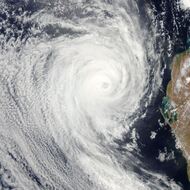Above average number of cyclones forecast for upcoming cyclone season.
| Date: | Wednesday, 19 October 2016 |
|---|
The upcoming cyclone season could see a higher than average number of cyclones hit the North West according to the Bureau of Meteorology's Australian Tropical Cyclone Outlook for 2016 to 2017.
The bureau's outlook found that the Northwestern sub-region, which includes the Pilbara and Kimberley, has a 63 per cent chance of more tropical cyclones than average and a 37 per cent chance of fewer tropical cyclones than average.
Typically, five cyclones form in or pass through this area each season.
Simon Ridge, the Department of Mines and Petroleum’s Executive Director Resources Safety, said the bureau's advice was a timely reminder for mining and petroleum operations throughout the State to ensure contingency plans are established and can be activated when needed.
“It is critical that mining and petroleum operators have adequate plans and provide appropriate training to protect workers from hazards at the workplace, including natural hazards such as cyclones,” Mr Ridge said.
A joint safety alert developed by DMP and WorkSafe offers the following advice for workplaces in cyclone-sensitive regions.
- Employers should develop emergency procedures and plans in conjunction with advice from DFES and other regional emergency planning groups where their work sites and camps are located.
- The emergency plans should include details for making the site safe and ensuring the safety of personnel as far as is practicable. This should include the removal or restraint of loose objects and structures and evacuation of personnel. The plans must be communicated to all personnel likely to be on site during the cyclone season.
- Every accommodation unit or donga and every transportable building on work sites in cyclone sensitive regions should be adequately secured.
- During the Blue and Yellow Alert Cyclone Warning phase, a safe and orderly evacuation of non-essential personnel from the work site or camp should be considered before high intensity cyclones pass by.
- To prevent injuries during transfer, any personnel remaining on site during the cyclone should be moved to a designated appropriate shelter well in advance of the arrival of the cyclone.
- Where personnel are required to stay on site, adequate stocks of food and other essential items should be available during the period when the site may be cut off due to high winds or flooding.
- During the Red Alert Cyclone Warning phase, when all power has to be isolated or in the eventuality of damage or interruption occurring to the power supply or telephone and internet connections, an adequate means of reliable emergency backup communication should be available on site to make contact with external emergency services should help or assistance be required.
- Each site should continuously monitor cyclone warnings issued on radio, television or the Bureau of Meteorology or DFES websites. Battery-powered radios should be available in the event of power interruptions on site.
Additional information on preparing for cyclones can be found at:
The cyclone season officially begins on 1 November.

